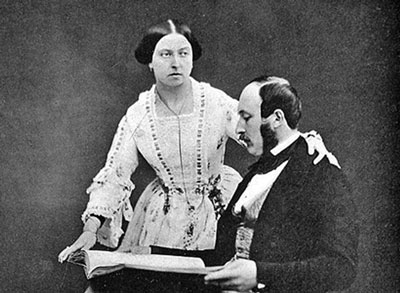Tennyson’s To The Queen
By Brian Conway ’23

Upon first look at Tennyson’s last section of his Idylls of the King, I think I was so used to reading about the world of Camelot that I interpreted To the Queen as a letter to Queen Guinevere (and the “Prince” referencing Arthur). Once I remembered Tennyson’s Dedication to Prince Albert (pictured left with the Queen), it made more sense that Tennyson was rather writing to Queen Victoria and referencing his own times ruled under the “crown’d Republic” (302.61).
This note to the queen symbolizes Tennyson’s hope for Britain in the Crown, even in the midst of uncertainty and anxiety amongst the British people. He invites the Queen to take this book of idylls: “take withal/Thy poet’s blessing, and his trust that Heaven/Will blow the tempest in the distance back/From thine and ours: for some are scared” (302.45-48). Tennyson’s confidence in Queen Victoria shows that he cares for her and believes that she can do what is best for England.
At the same time, he warns her that the public is scared for the future and that there is essentially a ‘storm’ that needs to be blown back, away from Britain. This honest outlook on English society and its place in history allows Tennyson’s work to truly mean something in regard to his nation; he first questions why anyone would write about King Arthur in his “Epic” (1842), and he now answers that question as he gifts his Idylls to Queen Victoria. As we have studied in class, Tennyson’s stylistic and literary changes from Malory’s original Morte ‘d Arthur conveyed a general anxiety of the Victorian period, but the fact that Tennyson feels comfortable enough to tell the Queen directly how he feels about this anxiety is representative of the fact that he does not write for satirical purposes or just for fun. Rather, his reworking of Medieval literature will help the Queen understand what Tennyson has learned about English society through his studying of Arthur and the Round Table.
At the end of his poem, Tennyson counts on the throne being filled by a common-sense leader such as Victoria who will dispel the fears of the British people, unlike what occurred in “that battle to the West,”/Where all of high and holy dies away” (302.65-66). His comparisons to King Arthur and the world of Camelot highlight his wisdom about the mistakes that were made in Arthur’s court. The vices of hypocrisy, betrayal, and lust, among others, cause the Knights to turn on each other and ultimately lead to the destruction and decay of the Round Table. Tennyson hopes for a brighter future and he blesses Queen Victoria with the confidence that she will carry Britain to brighter days ahead, and this poem is an ode to the Victorian period’s place in English society.
Photo: https://robertstephenparry.com/endymion/the-poet-and-the-queen.html





